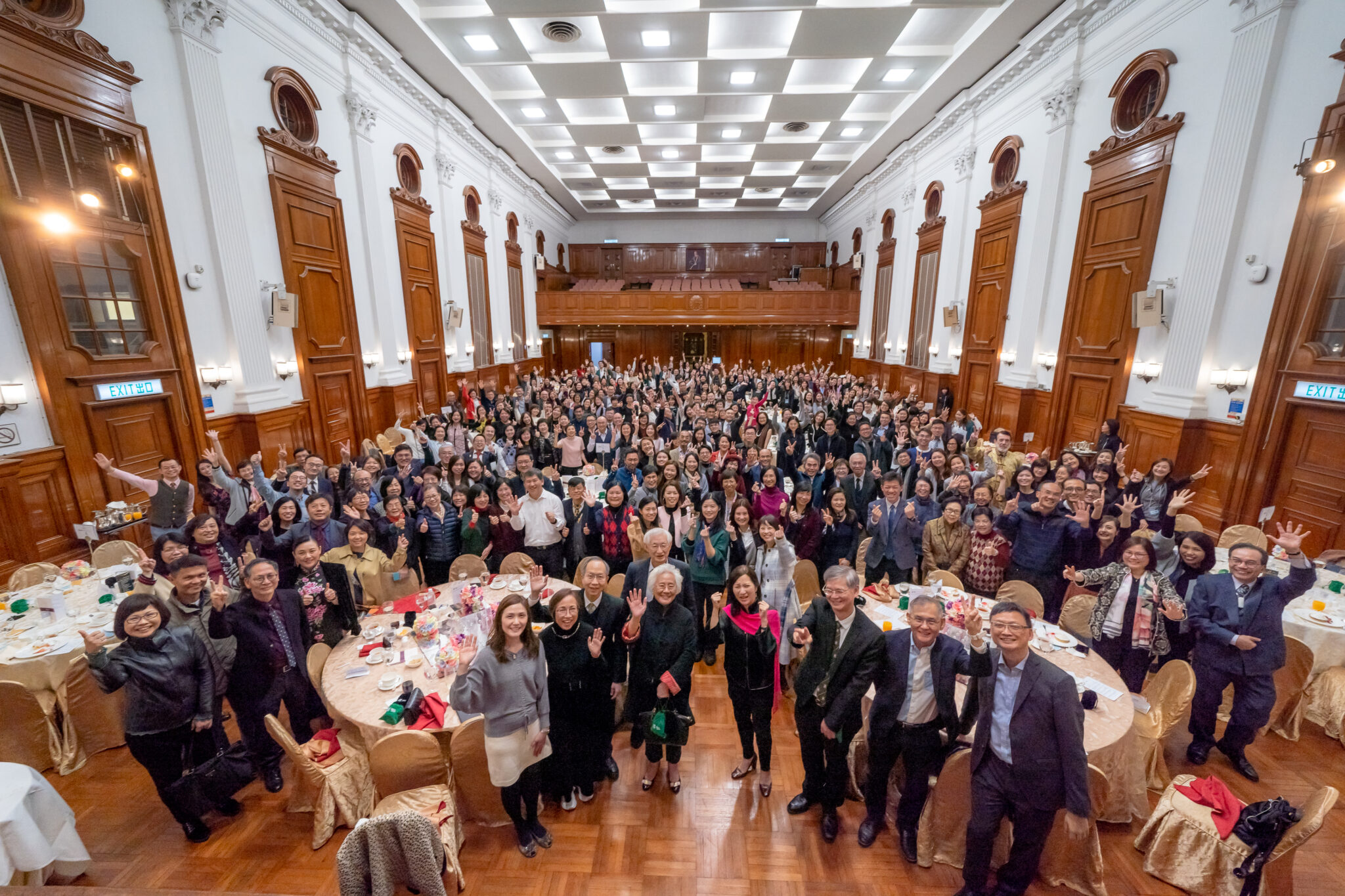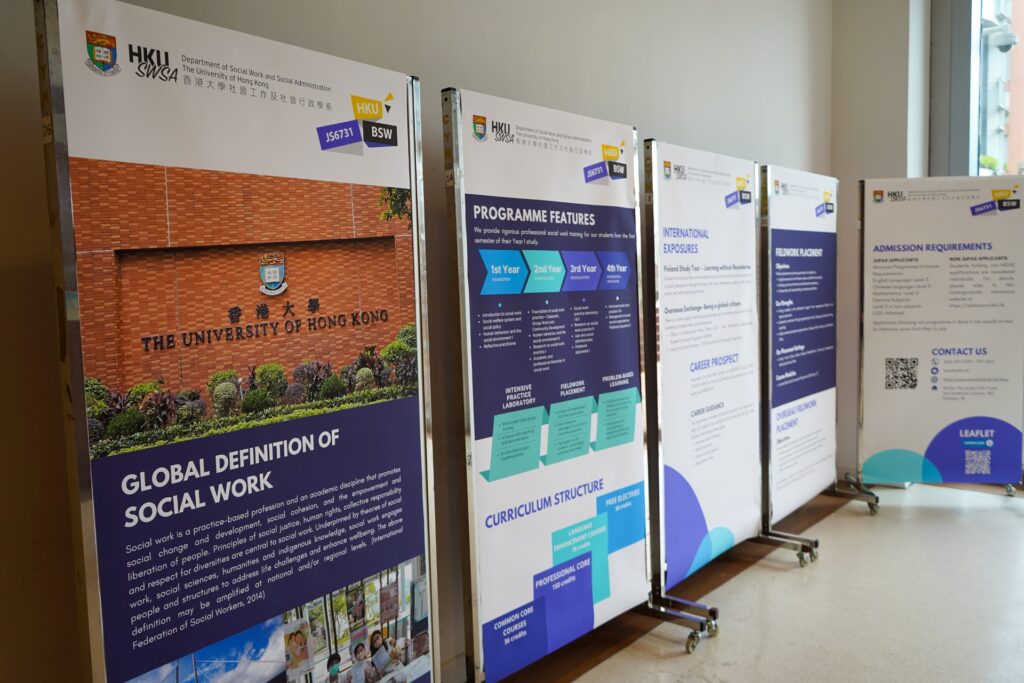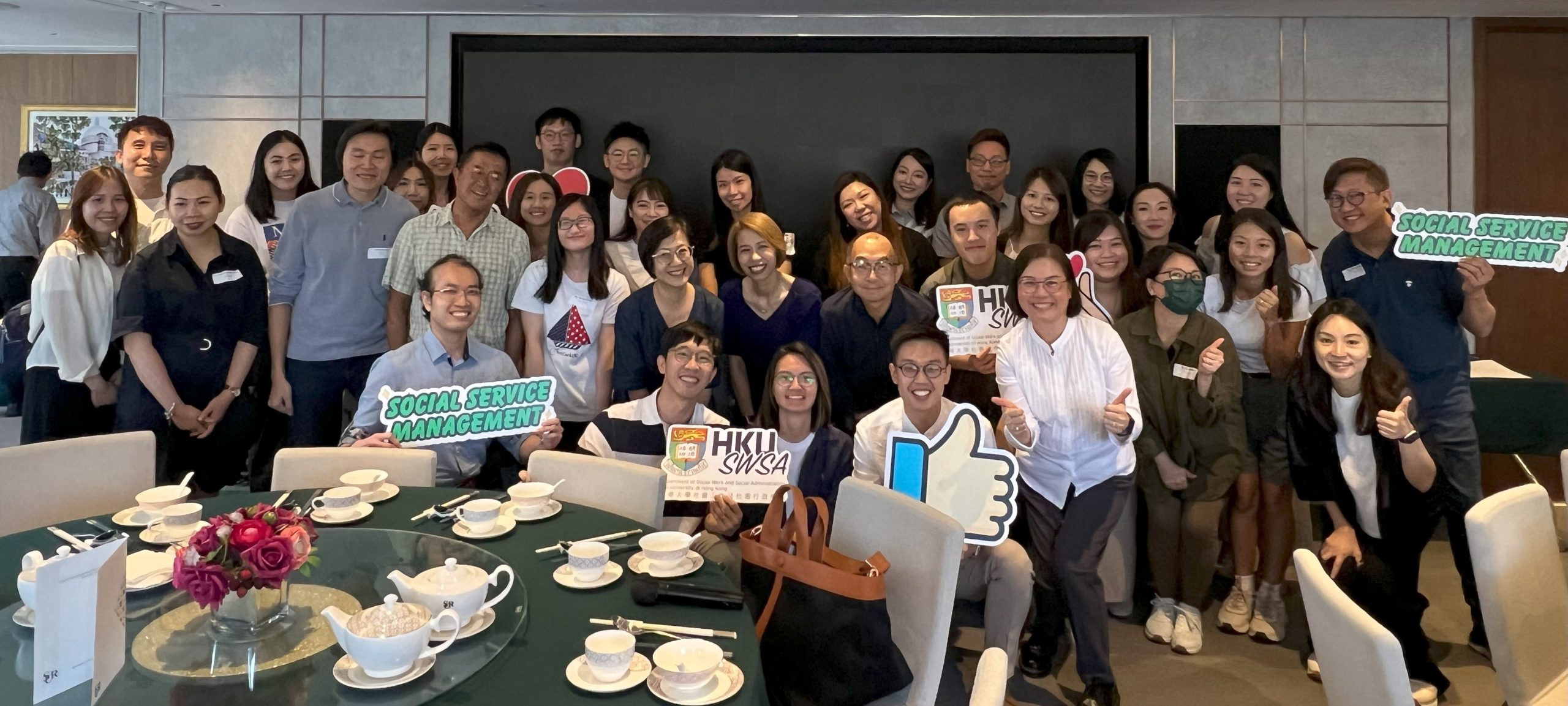MSocSc (Social Service Management)
Director’s Message
Prof. Frances Law
PhD, MSW, BSocSc, RSW Associate Professor
In the social service sector, good management is crucial to ensuring the quality and efficiency of service delivery to the public. The multifaceted aspects of management include corporate governance, strategic planning, human and financial resources, leadership, the use of information technology, risk and change management, and, more recently, sustainability and impact assessment. Social service management differs from business management in having a social dimension that emphasises social values rather than profit-making. Yet, performance-driven management and demand-led marketisation are of increasing concern in the social service sector, which make the management process in this sector increasingly complex and challenging.
In the Hong Kong context, the lump sum grant subvention system, service contract system, competitive funding environment, recent expansions in children, youth and elderly services, cross-sectoral partnership and collaboration, high turnover of middle- to top-level management, and the recent social distancing of COVID-19, all pose both challenges and opportunities for social service leaders, with multiple directions being explored in addition to finding ways to improve existing service delivery systems.
The programme of MSocSc in SSM (MSSM) looks for students with strong potential and ambition for career advancement in the social service field. It provides them with a collaborative learning environment that exposes them to a variety of managerial issues and challenges and empowers them with knowledge and executive leadership training to drive impactful social change and development.
We are here to make social impact!” is your reason to choose HKU Master of Social Sciences (Social Service Management). Our program inspires you to create community-led innovation, rethink service users’ needs with client-centered approach and brainstorm any new development directions local social services could have.
Getting yourself ready for tackling today’s and tomorrow’s social needs and challenges, let’s apply our program now!
Introduction: Why Choose This Programme?
This course is ideal for those looking to advance their careers in the social services sector. The rapidly changing socioeconomic environment calls for the development and application of new solutions and technologies. According to the Social Welfare Department, HKSAR, there are close to 170 local NGOs currently receiving a regular funding subvention from the government as of 2020, totalling in excess of HK$18.4 billion [1] annually. This is a growing sector. The MSocSc (SSM) Programme has close ties to Hong Kong’s social services and will prepare graduates for fast-track development towards meeting the demand for middle to senior-level managers, as well as fostering the skills for social innovation needed to combat social challenges of the 21st century.



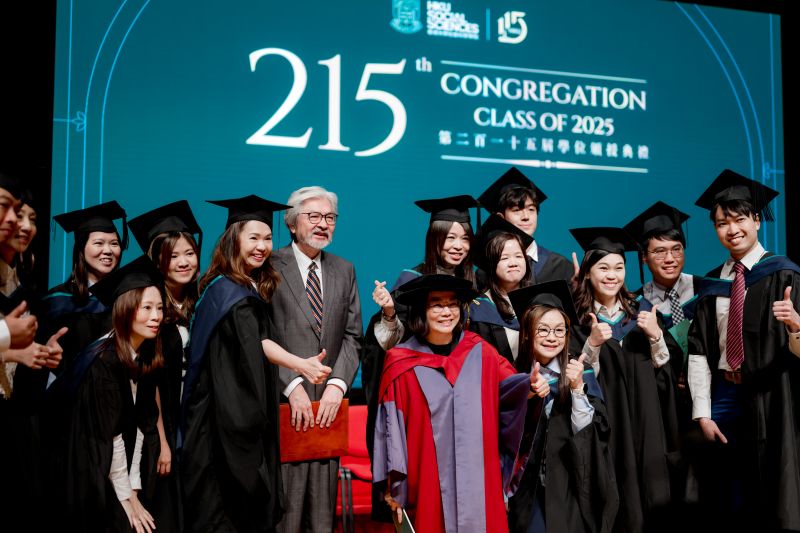
Opportunities and challenges
- Expansion in social service sector, e.g. school, early childhood education, parenting, online youth services, and elderly services; innovative projects funded by private donors, etc.
- Emerging new solutions and social innovations which might help resolve old social problems;
- Rapid changing socio-economic environment and application of new technologies.
Significance to MSocSc(SSM) Programme
- We anticipate increasing demand for familiarity with the organisations working in the sector and greater availability of good sources of quality and relevant experience .
- There is substantial demand for training offered on a part-time basis to local middle- to senior-level managers.
Objectives
The social service sector demands managerial staff who embody management knowledge in a host of areas, including human resources, finance, fundraising, marketing, organisational management, strategic management, social policy and administration, research and evaluation, and the use of information technology in service delivery, to name just a few. The MSSM programme prepares social service managers to meet the challenges that human service organisations face today and will face in the future.
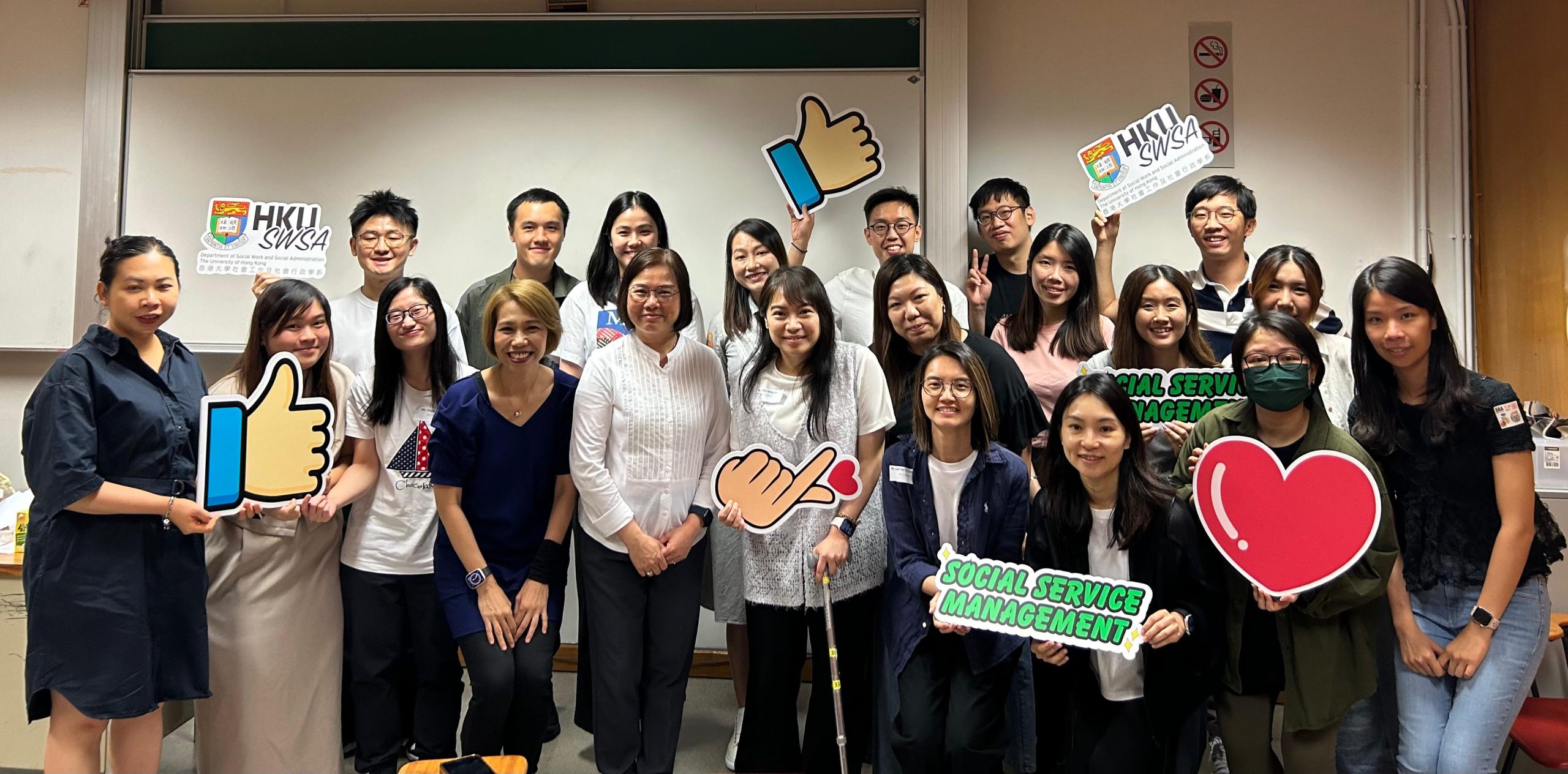
Learning Outcomes
After completion of this two-year part-time intensive programme, students are expected to exhibit the following highly-regarded skills and competencies:
- Critical inquiry capabilities and the up-to-date knowledge and research skills needed in the management of social service organisations
- Competency to apply social service management knowledge and research skills to practice or theoretical exploration, demonstrating originality and creativity
- Ability to tackle novel situations and ill-defined problems that may arise in the provision of social services.
- Collaboration and communication skills needed to convey social service management knowledge to social service specialists and the general public
- Awareness of and adherence to personal and social service professional ethics
- Enhanced leadership and advocacy skills for use in social services and social policy
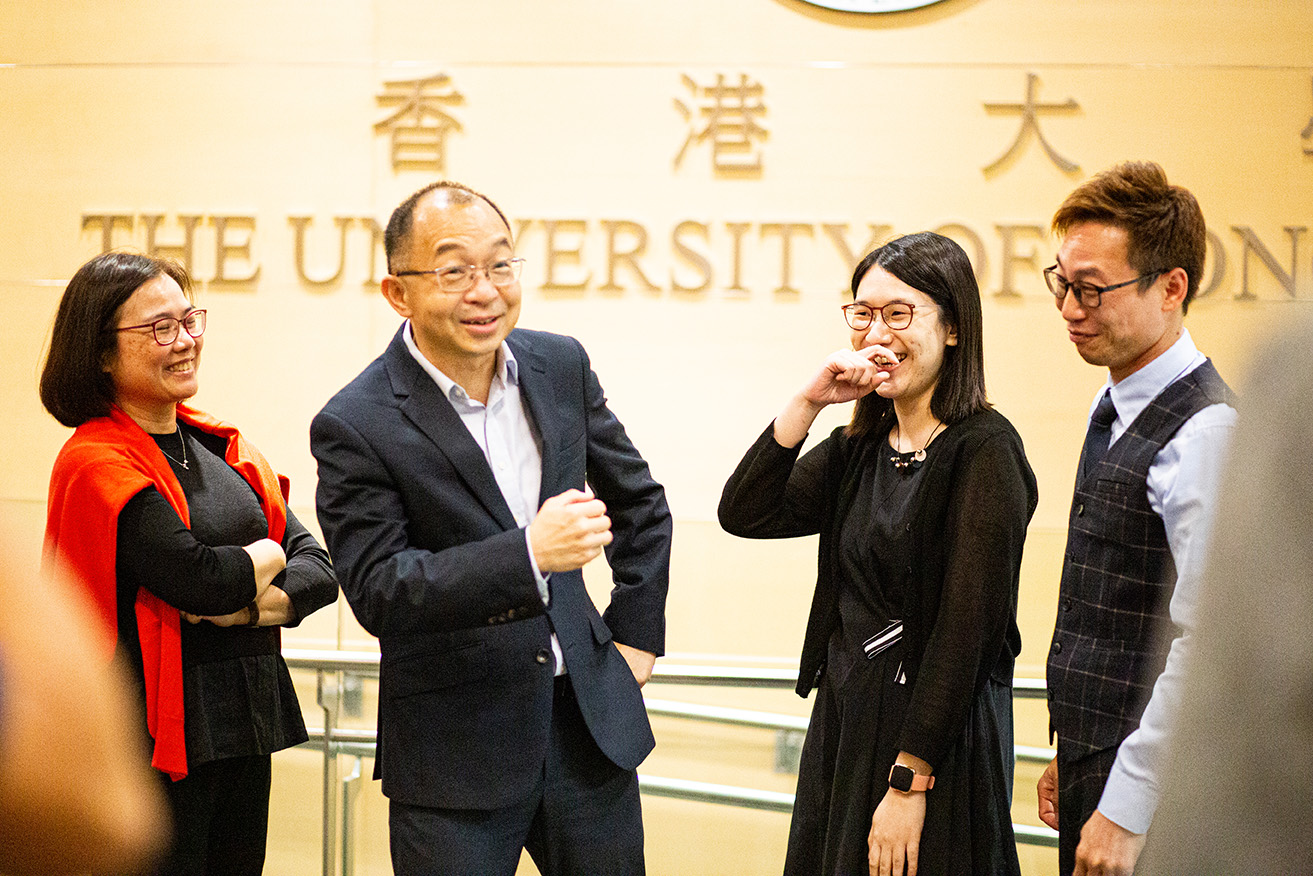
Who will benefit from the programme
The social service sector demands managerial staff who embody management knowledge in a host of areas, including human resources, finance, fundraising, marketing, organisational management, strategic management, social policy and administration, research and evaluation, and the use of information technology. The MSSM programme prepares social service managers to meet the challenges that human service organisations face today and face in the future. In addition to the following highlighted compulsory courses, students are offered elective courses from a range of related disciplines.
Period of Study:
Two academic years of part-time mode
Candidates are required to complete 60 credits, including 6 compulsory courses and 4 elective courses or 2 elective courses with a dissertation.
Compulsory Courses
The knowledge base of human service practices comes from a wide spectrum of social science disciplines including psychology, sociology and political science. This course will provide the philosophical and conceptual basis for analyzing social problems and issues and translating these theoretical constructs into human service practices.
Assessment: 100% coursework
The course introduces and examines concepts and practices critical to good financial planning and management. The objective is to enable students to learn skills and strategies for budgeting. Emphasis will be given to the understanding of the financial activities and reports essential to management, as well as analysis and use of financial information in planning, budgeting and measuring results to promote the organization‘s mission and goals.
This course provides a framework of analyzing and formulating social policy in the current social, political and economic environment. Current social welfare policy issues including social welfare planning mechanisms, welfare blue print, strategic framework for social welfare, district planning, and other relevant issues will be examined.
This course covers the whole research process from the development of research questions and hypotheses to the analysis of data as well as presentation of findings. Different data collection methods from qualitative method, survey, experiment, case study, interviews, to focus groups will be discussed. Data analysis on various types of data including secondary data will be discussed. Students will be expected to integrate and apply the knowledge and skills they acquired through the programme by attending the oral presentation by the end of the first semester of the final academic year of study.
This course aims at helping managers of human service organizations to be equipped with the knowledge in strategic management to deal with the current challenges arising from the rapidly changing public and social service scene. Topics may include strategic planning, quality management, risk management, change management, business process re-engineering, etc.
The course aims to equip students with knowledge and skills in managing and developing human resources in social service organizations, and examining related current issues, and to stimulate applications in local context. Issues related to the human resources management and development including recruitment, selection, performance management, training and development, and succession planning will be covered, and topics on personal efficacy as a leader will also be examined with practical examples. Upon completion of the course, students will be able to master the basic principles of HR management and development and apply them in social service context.
Assessment: 100% coursework
Elective Courses
This course is designed for students with an interest in understanding all aspects of social life and social relations especially those who will undertake a dissertation study. Starting with the question what is reality, the course begins with an introduction to different perspectives on approaching reality, followed by an assessment of the general strengths and weaknesses of qualitative research in comparison with other conventions such as quantitative surveys. The lectures will focus on introducing the general process of ethnographic research and the variety of methods for data collection and analysis including ethnography, grounded theory, observation, interviewing, focus groups and narrative analysis, etc. Various cases will be used to demonstrate how qualitative research helps make meaningful policy and social work practice. Seminars will be organized around practical methodological issues with the objective of helping students proceed with their own research projects. Hands-on experience of a range of research techniques will also be provided.
This course covers various statistical analyses that include single variable, bivariate, and multivariate analyses. Appropriate analyses for different types of data will be discussed and various techniques in scale development including reliability and factor analysis will be introduced. Apart from various multivariate linear modeling and path analysis, non-parametric analyses will also be introduced.
The Hong Kong society and the world at large have unfolded multifarious new social phenomena that pose new challenges to professional social work practice. The social work professional community has to develop new insights in understanding the nature of such problems and challenges, and to accordingly devise timely and appropriate intervention to address these issues. This course aims at introducing the concept of social entrepreneurship and how it creates social change. We will examine the current global development of social entrepreneurship as well as local development and its development in Greater China and South East Asian countries. We will inspire our students to become an active agent in addressing the pressing social issues and making social change.
There are emerging new issues and problems as well as challenges in the social service sector that require managers and practitioners to be equipped with updated knowledge and skills in tackling such problems and facing such challenges. This course will bring in the most contemporary issues, problems and challenges, with reference to updated research findings and innovative practices in the field, to enable students to be well prepared for performing their managerial duties in the social service sector.
Assessment: 100% coursework
There are emerging new issues and problems as well as challenges in the social service sector that require managers and practitioners to be equipped with updated knowledge and skills in tackling such problems and facing such challenges. This course will bring in the most contemporary issues, problems and challenges, with reference to updated research findings and innovative practices in the field, to enable students to be well prepared for performing their managerial duties in the social service sector. Assessment: 100% coursework
Social service organisations operate in an environment with various stakeholders, like service users, service purchasers, volunteers, donors, funders, neighbours, policymakers and press, etc., who have different exchange relationships with them. Marketing is about the effective management of an organisation’s exchange relationships with its various markets and publics. This course provides students with the theoretical concepts and skills in marketing that are applicable in the social service sector with an emphasis both on using traditional and digital techniques. Upon completion of the course, students will be able to master the basic and latest principles of marketing and apply them in social service context.
Assessment: 100% coursework
Resource is necessary for an NGO to support its means and services in actualizing the mission. Securing funds have become more and more competitive and NGOs have attempted to diversify sources of funding. Raising funds, writing proposals and developing innovative ways to generate resources have become regular activities of NGOs. This course covers topics such as understanding of giving behaviour and the current trend of philanthropy, cost-effectiveness of various fundraising activities, effective strategies including building a prospective relationship, essential elements in a grant proposal and pitching, presentation of results and impacts, accountability and report, handling of ethical issues and risk management etc.
Assessment: 100% coursework
There are emerging new issues and problems as well as challenges in the social service sector that require managers and practitioners to be equipped with updated knowledge and skills in tackling such problems and facing such challenges. This course will bring in the most contemporary issues, problems and challenges, with reference to updated research findings and innovative practices in the field, to enable students to be well prepared for performing their managerial duties in the social service sector.
This course introduces concepts and system for better understanding and in-depth analysis on practice of corporate governance of social service organization receiving public funding. It emphasizes, from the management perspective on the leadership of board and senior management/social work professionals for effective service and achievement of mission of the organization. It takes reference to real life cases and issues. It stimulates development of a framework to understand perspectives of different stakeholders and for ongoing application and developing effective intervention.
This course is suitable for candidates who are in position, from frontline team leader to senior supervisor, or aim to become future leaders in social service organization with management responsibility.
Assessment: 100% coursework
This course aims to equip students with knowledge and skills in handling and utilizing information and communication technology in managing social service organizations and service delivery. The course content includes: Trends and issues of technological development in society and human services, process of developing and managing IT projects, use of ICT and social media in direct services, Assistive technology and gerontechnology, Security and ethical use of ICT and social media, and Emerging trends and its future use in human services.
Assessment: 100% coursework
(1) Candidates can take elective courses in other fields of study under the Master of Social Sciences (Behavioral Health, Gerontology, Mental Health, Nonprofit Management) and the Master of Social Work programmes. Special approval from the respective Programme Directors for the courses in the above-mentioned fields of study or programme is needed.
(2) Not all elective courses will necessarily be offered in a given year.
Dissertation
Student can opt for dissertation for two additional elective courses.
The title of the dissertation shall be submitted for approval not later than five months before the formal submission of the dissertation or not later than March 31 of the same academic year of study. The dissertation shall be presented by not later than August 1 of the same academic year of study. The dissertation shall be a critical study that demonstrates the application of research methodology to the investigation of problems relevant to the field of study, and shall not exceed 20,000 words in length.
| Faculty Members | ||
|---|---|---|
| PROF. FRANCES LAW. | Associate Professor | Teaching Course: SOWK6265 Research methods in human service |
| Dr. BEN LAW | Senior Lecturer | Teaching Course: SOWK6139 Theoretical foundation of human service practices |
| PROF. CK LAW | Adjunct Professor | Teaching Course: SOWK6217 Current social welfare policy issues |
| Mr. FRANCIS AU | Honorary Lecturer | Teaching Course: SOWK6342 Corporate governance for the management in social service organizationA |
| MR. DAVID FUNG | Honorary Lecturer | Teaching Course: SOWK6289 Organisational analysis and strategic organisational management |
| Miss Lois Lam | Honorary Senior Lecturer | Teaching Course: SOWK6339 Human resource management and development in social service organisations SOWK6340 Marketing strategies and applications for social service organisations |
| Dr. Luo Tingyu | Honorary Lecturer | Teaching Course: SOWK6265 Research methods in human service |
| Mr. CALVIN HO | Honorary Lecturer | Teaching Course: SOWK6156 Financial planning and management for social service organizations |
| MS. HEIDI CHING | Honorary Lecturer | Teaching Course: SOWK6325 Information and communication technology in human service organization |
| MS. REBECCA WONG | Honorary Lecturer | Teaching Course: SOWK6341 Fundraising and resource development: Effective strategies and practice |


As a Management of a large NGO, this programme not only enhanced my professional competence but also empowered me to lead with greater confidence, strategic clarity and social impact. The programme provided a well-balanced curriculum that bridged theory and practice, strengthened my ability to make evidence-based decisions while remaining grounded in the core values. I strongly recommend this programme to current and aspiring leaders who are committed to advancing the effectiveness of social service sector.
Cheung Wing Suet Wendy

Leading in the social service sector requires a diverse set of knowledge and an adaptive mindset. I am highly impressed with how this programme has equipped me with practical knowledge and a strategic perspective, enabling me to become a more comprehensive leader. The opportunities to engage with experienced professors, lecturers, and classmates from diverse backgrounds have provided me with valuable insights for my work.
Fiona Fong



The programme has changed my views on how the social welfare in Hong Kong should operate and provide me insight into how the function and roles of a manager need to change. Indeed, the programme provide a good chance for me to equip myself with a strategic and analytical mindset, and integration of different knowledge from related social welfare settings professionally. It is beneficial to my career development.
Jordan Cheung

I have been working as a frontline social worker for years, and I begin taking up a middle-management role. Yet, I have never been equipped with comprehensive management knowledge. This program has enabled me to network with other students from different professional backgrounds. With the sharing from and discussion with peers, I could grasp a holistic picture in the social service industry. This program design is very holistic.
Colin Leung



The programme is very helpful and the learning is fruitful. The curriculum is well structured and the lectures are well prepared and qualified for the teaching. Mutual learning from other classmates through group projects is joyful.
David Fung

The programme not only equip me with the knowledge and acquire skills, but also brings me new insights, sharpen my analytical skills and broaden my vision through communicating with professionals from the NGO sector, all these are important elements for my career development to be a more professional and up-to-the-time CSR practitioner.
Karen Lau

The MSocSc (Social Service Management) programme equips graduates with the advanced knowledge and leadership skills required to meet the growing demand for middle to senior-level managers in Hong Kong’s expanding social service sector. Graduates will be well-prepared to take on managerial roles in a range of areas such as human resources, finance, fundraising, marketing, strategic planning, and policy administration within NGOs, social welfare organizations, and community service initiatives. With the rapid changes in the socio-economic landscape and the increasing integration of innovative technologies, this program also prepares professionals to address emerging challenges and drive impactful social innovations. By fostering leadership, critical inquiry, and ethical awareness, the program supports career advancement in diverse fields such as early childhood education, youth services, elderly care, and cross-sectoral partnerships, contributing to meaningful and sustainable social change.
| Activities | Date | |
|---|---|---|
| Information Session | Date: 1 December 2025 (Monday) Time: 7 pm - 9 pm Venue: CPD-G.02, Centennial Campus, HKU Registration by 28 November 2025, 12noon: https://hkuems1.hku.hk/hkuems/ec_hdetail.aspx?guest=Y&ueid=103398 | |
| Online Application Opens | 2 Oct 2025 | |
| Deadline of Online Application | Round 1: 2 Dec 2025, noon | |
| Admission tests and Interviews | Round 1: Mid to late-Dec 2025 | |
Shortlisted candidates will be invited for a written test and interview.
Applicants shall hold a Bachelor's degree of HKU or an equivalent qualification from a comparable institution, and preferably have a minimum of two years of relevant post-qualification working experience. Candidates with qualifications other than a Bachelor's degree will be considered on their individual merits. Qualifying examinations to test the applicants' abilities to follow the prescribed courses and/or interviews may be conducted.
Applicants with qualifications from a university or comparable institution outside Hong Kong where the language of teaching or examination is not English are required, unless exceptionally exempted, to obtain:
(1) a score of 550 or above (paper-based test) or 80 or above (internet-based test) in the Test of English as a Foreign Language (TOEFL); or
(2) a minimum overall band of 6 with no subtest lower than 5.5 in the International English Language Testing System (IELTS); or
(3) grade C or above in either the Overseas General Certificate of Education, the International General Certificate of Secondary Education, or the Cambridge Test of Proficiency in English Language.
The tuition fee is $231,840 (HK$115,920/year) for 2 years of part-time study.
Prof. Frances Law
Programme Director
- flawhk@hku.hk
- (852) 3917 5940
Programme Secretary
- mssm@hku.hk
- (852) 3917 3814
Programme Enquiry
- mssm@hku.hk
- (852) 3917 2075

